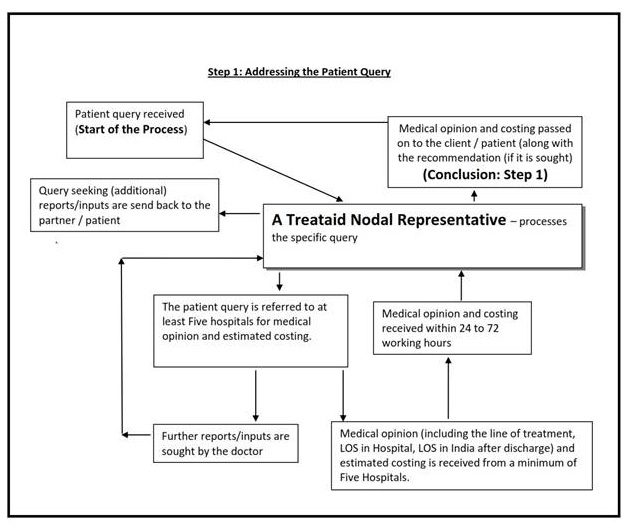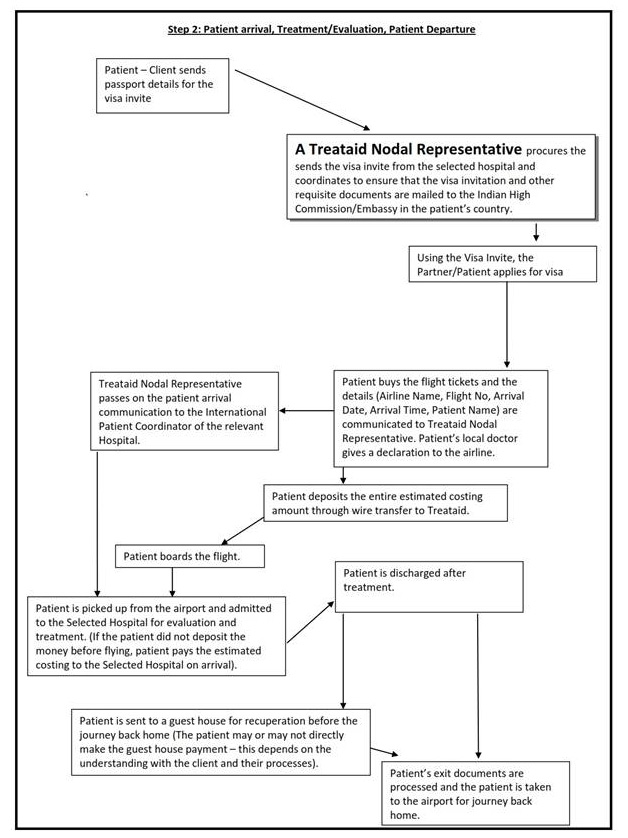- The best-in- class clinical solutions to the patient along with equally impactful non-clinical support
- The most economical cost for the purpose which also adheres to the predictive exercise
- Once the treating hospital has been selected, the agent then needs to handhold the end-to- end treatment process, including but not limited to:
- Procuring visa invitation
- Guiding the patient and family to complete the correct paper work before boarding the flight for the target territory
- Coordinating timely reception of the patient and family at the airport
- Coordinating the treatment process
- Ensuring that (after arrival) the predictive exercise of costing and line of treatment is not changed unless the original (pre-arrival) diagnostic reports were incorrect.
- Coordinating to assist the patient and family to complete all the regulatory needs in the target territory (including visa renewal, foreigner registration, treatment related
- paperwork, etc)
- Coordinating the guesthouse needs of the patient and the family (in line with the needs and expectations of the medical traveller)
- Coordinating to ensure all the exit papers and processes are in place – so that the patient and family do not get blocked or hampered while leaving the target territory
- back for home
- Coordinating post-care (as and when required)
- Coordinating followup trips (as and when required)
Broadly the activity lifecycle of the agent facilitation process is split into the following two charts:


2. Describe the problems faced by foreign patients while they come and during their stay in India?
The problems faced by the foreign patients in India include.
- Language barriers (especially for the non-anglophone speakers – as well as iin coordination with non-educated service providers in India – such as sweepers, taxi drivers, guesthouse helpers, etc)
- The way the travelers think as against the way the Indian hosts think – it is cultural impact – this kind of leads to discrimination against the travelers
- Food
- Finding a suitable guesthouse (getting cheated by the guesthouse owner/staff and/or ground transport staff)
- Unreasonable pricing at the non-hospital shops
- Lack of care and compassion (empathy) by the coordinators as well as the hospital staff (including clinical staff)
- Overbilling / overtreatment (including inadequate clinical counselling by the treating doctor)
- Food – this is a major bottleneck
- Post-care medication guidance (especially for the organ donation patients)
3. How do you assess Indian Hospitals way of management of international patients? (Customer handling, Cost, Ethics, Timing)
Indian hospitals have matured (over the years) in their management of international patients. However, there are still gap areas that have the potential of being show-stoppers or acting as strong deterrents. Customer handling is largely okay in organised setups but the implementation leaves a lot to be desired. They still need strong intervention either from the embassies and/or organized sector agents to ensure that the “right” process are implemented and right responses are given. If left alone (without a mentor – in terms of embassy official or agent) the customer handling could be less than expected, cost could (and does) zoom, throwing ethics to the wind, and leading to a longer duration of stay, thus adding to the cost and inconvenience. We do not let Hospitals do to revise cost estimate after patient arrives in India (if the pre-arrival medical reports were correct).
We have been instrumental in developing the brand equity of treatment in India –we have achieved this through timely and accurate responses, coupled with putting patient-interests above everything else. We are very quick in responding to the patient requests/complaints (post-arrival)
4. What do you think is the best way to manage the medical tourism effectively and efficiently?
The best way to manage medical tourism is to put patient first and develop/implement processes that put empathy at the core of the entire lifecycle (as against sympathy). We all have to undergo medical ailments and visit a hospital/doctor. We should keep this in mind always while participating in medical tourism.
Another very critical aspect is expectation management. Every human has a different expectation – and meeting all of those is impossible – this lack of meeting expectations sets the interaction for a bitter end and bitter parting of ways. Hence, it is critical that the patient care process should – besides coordinating the treatment – also work to manage expectations of the patient and his co-traveller/family member. This primarily should include that we do not let the patient/attendant hit by a surprise. They should be adequately counselled (vide a written document and vide verbal communication – if required) prior to their leaving the home country for treatment. The handling of this aspect would ensure that the patient gets the right clinical and non-clinical handling of the matter.
Also, the deployment of technology and harnessing the strengths of transparency play a critical role in not just expectation management but also in meeting the expectations. If the agents know precisely what is happening with the patient and co-traveller and if the patient/co-traveller/client know what they will get at which step – this would lead to a hitch-free (or hitch-minimized) coordination lifecycle.
5. Any other comments
TreatAid/Harinder Medicare And Solutions Pvt Ltd always focus on getting the best possible clinical care at the best prices available. In case if we see that either the clinical care is being compromised or the cost is going haywire, we immediately move in to ensure that neither the patient nor the sponsor suffers.
Healthcare services offered by Treataid, connect individuals to affordable, world-class care in organ transplants, kidney failure treatment, heart surgery, cosmetic surgery, neurosurgery, dentistry, stem cell therapy, IVF treatment, male & female infertility treatments, offered by carefully selected our hospitals network in India that all meet international accreditation standards for hospitals and medical clinics.



